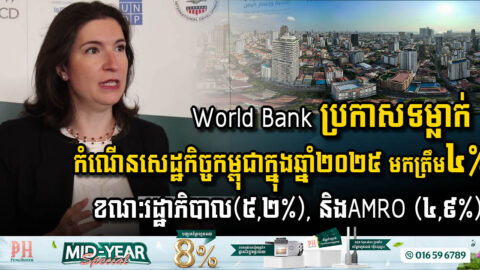Chinese Investment to Boost Bavet City with New 5-Star Hotel
In a significant development for the local economy, YUNYA Hotel Co., Ltd., a Chinese company, has announced a substantial investment exceeding 60 million USD to construct a luxurious 5-star hotel in Bavet City. The provincial authorities have already conducted inspections at the project site, signaling the commencement of this ambitious venture. During a site […]
Government Proposes Enhancements to Phnom Penh-Sihanoukville Expressway Aesthetics and Safety
In a significant effort to enhance the visual appeal and safety of the Phnom Penh-Sihanoukville Expressway, the Concession Agreement Management Committee convened discussions on June 2, 2025, featuring representatives from the Ministry of Public Works and Transport, the Ministry of Economy and Finance, and various industry experts. The meeting focused on five key proposals aimed […]
World Bank Lowers Cambodia’s Economic Growth Forecast to 4% for 2025 Amid Global Challenges
In a pivotal update on Cambodia’s economic landscape, the World Bank has downgraded its growth forecast for 2025 from a promising 5.5% to a more tempered 4%. This revision, announced on June 11, reflects a broader pattern acknowledged by both the Cambodian government and the ASEAN+3 Macroeconomic Research Office (AMRO), as they pinpoint similar trends […]
France and the EU Committed to Enhancing Cambodia’s Water Sector
France and the European Union have reaffirmed their dedication to supporting the development of Cambodia’s water sector, with France planning to allocate a substantial €275 million in funding for the years 2025 to 2027. This commitment was announced by Ms. Sandrine Boucher, the Country Director of the French Development Agency (AFD), during a meeting with […]
Cambodia’s Agriculture Sector Set to Boost GDP Significantly by 2024
In a promising outlook for the Cambodian economy, the agriculture sector is projected to contribute nearly 17% to the country’s gross domestic product (GDP) by 2024, amounting to an impressive USD 7.82 billion. This information was unveiled in a recent press release following a meeting of the National Assembly and Senate on agriculture held on […]
National Road 7 Expansion Project Progress Report: 56% Complete
The expansion and upgrade of National Road 7, stretching from Skun Roundabout to Kizuna Bridge, has reached an impressive 56% completion, as announced by His Excellency Un Chanda, Governor of the Kampong Cham Provincial Government, during a recent Provincial Council meeting. The Governor provided a comprehensive overview of the project’s progress, highlighting notable advancements in […]



 ខ្មែរ
ខ្មែរ







